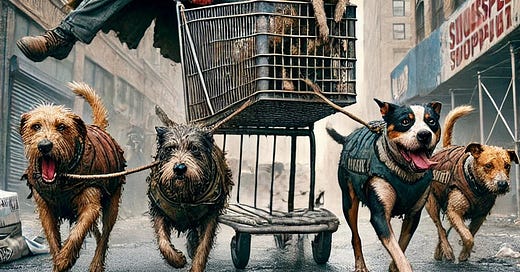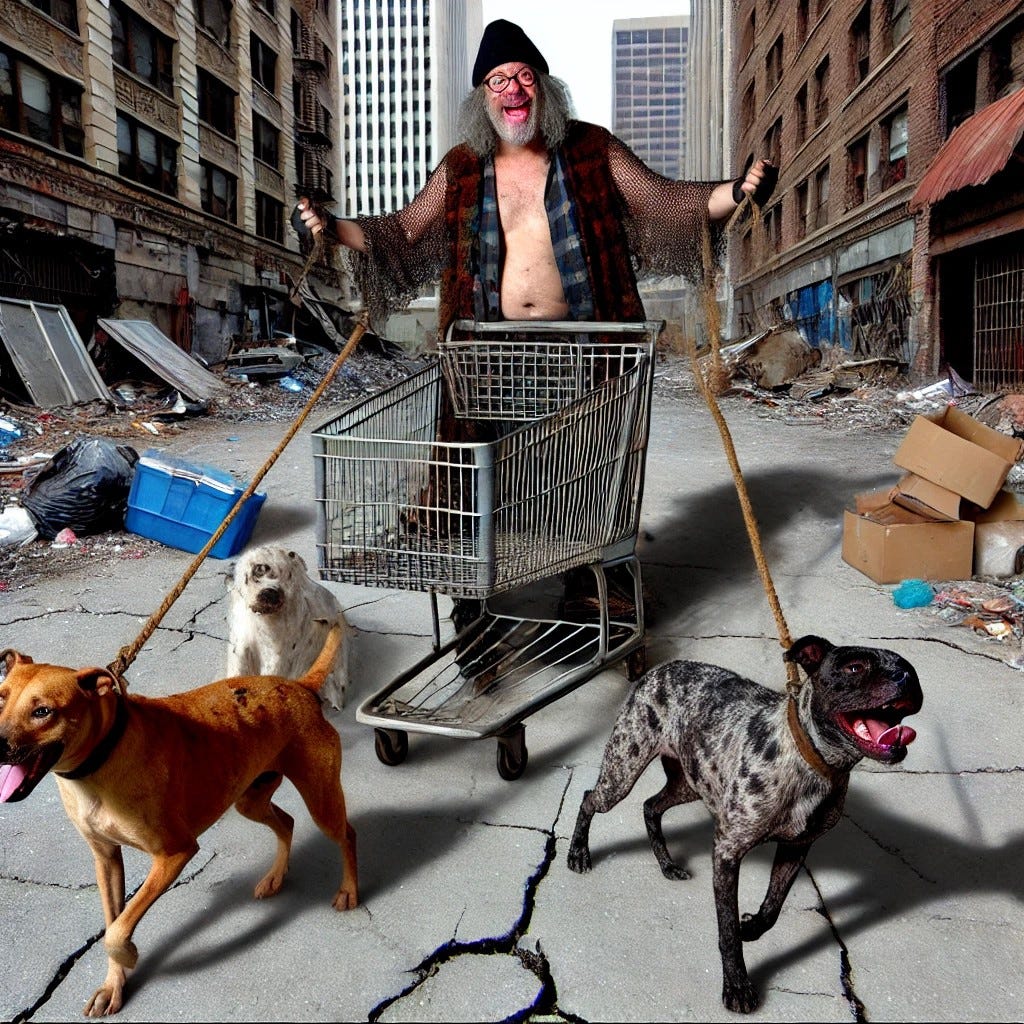MADE FOR YOU AND ME 2: hive Being (Stanzas 2017—part 39)
Let's workshop this stanza sequence about Hitler, dogs, bums, kings, cancer, death, automotive mechanics, Jim Morrison, caviar, shopping carts, apocalypse, TV dinners, hurricanes, humidity, dolphins
scent of the day: Myths Man, by Amouage
that vinegar band of brevity where the safe word has no efficacy sharp with a wrench your father’s clothes there in the corner, double-bagged still from the hospital wild horses grazing upon radiation hidden inside familiar green techno hypnosis in Japanese pachinko parlors of neon chain smoking is it even possible for a photo to be abstract? yet again, the later generation wonders why the earlier did not stop the horror dying for your view shows not its truth but your attachment how would we act if we began each day with a funeral? standing on the rear ledge of his shopping cart, the bum king hollers “Mush!” at his run-happy strays (coats as patchy as his) panting against the choke of his makeshift rope mechanism the board of white liberals found him such a skilled apologist for his continued confinement—baited by his verbal acumen (salesman-like)—that an inside voice whispered “Set him free!” a need to touch the ineffable, what eludes the iron cages of consonants and vowels, led him merely to smelt more neologisms if thousands could hallucinate that Jim Morrison whipped out his penis on stage in Miami, what— come on—are we to think of reports of miracles? trash-fish caviar the sanctuaries that take form in hard times the pubic triangle the urban sprawl began to dither when it touched the desert pedestrian deaths no longer news worthy, just something that happens dashiki hucksters preaching ankh arithmancy as black salvation—fuck that poison! unproblematic in that it is familiar—leather broken in, having caught so many hits the values of others may seep in far enough that you feel you do this for yourself at what age did you stop dreaming of a larger world? they are right: we can handle the little aluminum in the deodorant, but what about when we add up the little poison in everything else: the little mercury in the tuna, the little benzyne in the sunscreen? a collection big enough to take most members for granted— sit-down time for quiet intimacy spread thin even among those not drowned in the clamor bulk buying diet TV dinners for the last days even though you accept the asteroid is near— a denial too clever in its indirectness even for you garage-wall calendars blackened by mechanic fingers that rhetorical flex of been-there bravado wondering why you have lived so long older now than when your father died, the resemblance has begun to dissolve bare-pussy twerking, mare-like, at all the vanillas protesting hypersexual black music as stock as that dolphin overdub in Flipper, as montages of heads buzzed as bootcamp on what street did you live when your first dog died? so that he might have something to hand the birthday boy, the wife slips a present to the father (home from work for a drink) muggy heat, that ancient license to let go of any prudery, is now— for so many—so easy to escape in a land of rife with ignorance and yet hyper-specialization, can we blame doctors and lawyers for writing off even informed suggestions from PhD clients concerning how to treat the disease or win the case? not wanting to meet your husband-to-be until the wedding day, since you will be looking at him for the rest of your life attaining her hand by wooing the father: a skill, as with reading foldout maps, obsolete in most circles double-edged sword of big collection: a lot of options but less appreciation for those you fail to reach for might our secret excitement for horrors— hurricanes, Hitlers—stem from a feeling that they might reawaken grander dreams?
This is a portion of an ongoing mosaic poem called Made for You and Me. This portion is from the first installment: hive Being (Stanzas 2016-2020). More specifically, it is from the 2017 portion of that five-part work.








This poem presents a layered meditation on the collapse of personal and societal safeguards against existential and environmental decay. The title phrase, "that vinegar band of brevity where the safe word has no efficacy," immediately signals a situation where traditional mechanisms of protection, communication, and control break down. The metaphorical use of a safe word, often a tool of consent and boundary, is rendered powerless here, suggesting a world in which the boundaries between comfort and danger, self-preservation and destruction, are no longer maintained. This is a theme that resonates throughout the poem, which oscillates between deeply personal and grander societal reflections.
One of the most powerful images, "your father’s clothes there in the corner, double-bagged still from the hospital," evokes the stark reality of loss, the impersonal handling of death, and the attempt to distance oneself from grief through sterile containment. The use of “double-bagged” connotes both the literal precautionary handling of contaminated objects and a symbolic gesture to quarantine the overwhelming emotions surrounding death. This suggests a societal tendency to compartmentalize trauma, to sanitize grief rather than confront it.
In contrast, the image of “wild horses grazing upon radiation hidden inside familiar green” brings a startling clash between the natural and the artificial. The horses, symbols of freedom and untamed nature, now feed unknowingly on poisoned land, their innocence marred by the invisible dangers of human technology. This juxtaposition echoes a broader critique of environmental destruction masked by superficial normalcy, highlighting the ways in which the effects of industrialization and technological advancement seep unnoticed into the natural world.
The poem then veers into reflections on societal anesthesia through images like “techno hypnosis in Japanese pachinko parlors,” a reference to addictive, mind-numbing entertainment that distracts from existential threats. These lines suggest a critique of the contemporary tendency to avoid reality, drowning out real dangers with immersive, trivial distractions. Similarly, the question, “How would we act if we began each day with a funeral?” is a rhetorical challenge, urging the reader to consider the weight of mortality and the collective failure to confront it in a meaningful way. By living as if death and decay are distant abstractions, society avoids responsibility for its own decline.
Further, the poem addresses generational culpability, questioning why past generations did not act to "stop the horror," a reference perhaps to environmental degradation, systemic violence, or societal corruption. The silence of older generations is framed as complicity, and the poem portrays this neglect as an ongoing source of suffering for future generations. In the midst of these existential musings, the figure of the "bum king" hollering “Mush!” at his strays stands as an emblem of desperation and the crumbling of order, symbolizing how even those at society's fringes attempt to assert control in a world slipping into chaos.
At its core, the poem engages with themes of powerlessness, the futility of human structures against the forces of time and entropy, and the existential loneliness that accompanies the gradual realization of this powerlessness. It is a work that critiques the denial of uncomfortable truths—whether personal (grief, familial loss) or societal (environmental collapse, cultural anesthesia)—and challenges the reader to confront what has been systematically avoided.
existentialism, grief, societal collapse, environmental decay, powerlessness, control, modern distractions, generational guilt, human vulnerability, technological sedation.